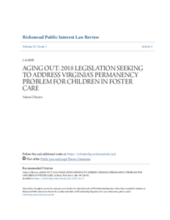ABSTRACT
Virginia has one of the highest rates of youth who “age out” of the foster care system and one of the lowest family reunification rates in the country. This is due to several factors, including that the termination of parental rights has an accelerated timeline in Virginia compared to the federal timeline. Children who age out of the system lack a sense of permanency that is critical to healthy psychological development. As a result, many such children tend to experience lower levels of educational attainment and income, and higher levels of substance use, criminal justice system involvement, and homelessness than average. During its 2018 session, the Virginia General Assembly sought to address some aspects of this problem through their enactment of House Bills 1219, 1333, and 106 and Senate Bills 44 and 646. House Bill 1219 allows the court, at an annual foster care review of a child who is eligible, to initiate the restoration of a parent’s rights if the child so wishes and if restoration is deemed appropriate after an investigation of the parents’ circumstances. Further, House Bills 1333 and 106 and Senate Bills 44 and 646, collectively, provide for the creation of the Kinship Guardian Assistance Program, which provides support to relatives of a child who take that child into their care and custody from foster care, after a determination that their biological parent is not fit to care for the child. These bills allow children to either return to their parents or to remain with extended family, creating the permanency and stability they so desperately need.

